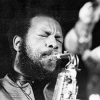Ornette Coleman

Ornette Coleman
Randolph Denard Ornette Colemanwas an American jazz saxophonist, violinist, trumpeter, and composer. He was one of the major innovators of the free jazz movement of the 1960s, a term he invented with the name of an album. Coleman's timbre was easily recognized: his keening, crying sound drew heavily on blues music. He was awarded a MacArthur Fellowship in 1994. His album Sound Grammar received the 2007 Pulitzer Prize for music...
NationalityAmerican
ProfessionSaxophonist
Date of Birth9 March 1930
CityFort Worth, TX
CountryUnited States of America
I mean, if you decided to go out today and get you an instrument and do whatever it is that you do, no one can tell you how you're going to do it but when you do it.
After I found out that I was playing music and that I'd have to learn how to read and write music, I started doing that about two years later. Finally, I said, "Oh, that means what I really want to do is to be a composer." But when I was coming up in Texas, there was segregation. There was no schools to go to. I taught myself how to read and how to start writing.
I'm having this conversation with you now. I'm talking, but I'm thinking, feeling, smelling, and moving. Yet I'm concentrating on what you're saying. So that means there's more things going on in the body than just the present thing that the person's got you doing.
For me, being an innovator doesn't mean being more intelligent, more rich, it's not a word, it's an action.
So, for instance, if you came to me, I'd ask, 'Do you want to write? Do you want to improvise? Why do you want to play this instrument? What do you want to do?'
So, for instance, if you came to me, I'd ask,'Do you want to write? Do you want to improvise? Why do you want to play this instrument? What do you want to do?'
Music is the say way. If you desire to play it or write it, then you have to get more information. But the end result is that you play music.
Those things are the results of what people see and hear that you do. But the human beings themselves are living on a multiple level.
I've been playing with Blackwell over 20 years. We used to play when I first went to Los Angeles. Blackwell plays the drums as if he's playing a wind instrument. Actually, he sounds more like a talking drum.
I remember once, we got an interview, and he said, 'Dad, these people are writing about me like I'm an adult. Don't they know I'm a kid?' I have never tried to encourage him to get a music image like other musicians have.
Actually, I have another record I made with them in 1976, but I've had such a bad experience with record companies, because I keep my head so much in music and not in business.
I've had those people very interested in my writing. Since I think of myself as a composer, I feel really good. I've had lots of guys call me up. I've gotten two or three commissions to write things. I've written lots of movie scores.
It just makes that person feel that what his work is is going to be more valid. But who wants to see a guy standing in front, looking like a bum, doing something that a bums don't do? This don't make sense.
Actually, when I was in elementary school, I saw a saxophone. A band came to my school, and I saw this guy get up and play this solo. And I said, 'Oh man, what is that! That must be fantastic!'